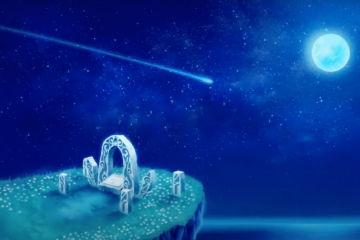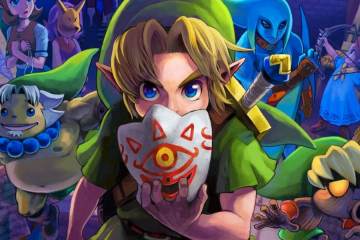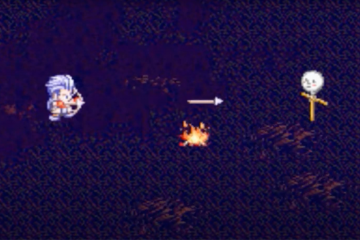Dear Cracked,
SOME REASONS WHY YOUR VIDEO ON NIOH IS INDICATIVE OF YOUR DETERIORATING INTEGRITY
Just figured I’d speak your language, baby.
I’m going to douse this introductory section with as much meta-commentary and nostalgia as possible, because I’m fairly certain that’s all you understand anymore. I can assure you of this, though: since what I am about to relay to you is a melange of my own personal experiences with your website and YouTube channel, what you are about to read is honest and accurate—unlike the bulk of your recent articles and videos.
Yes, Cracked, the difference between this op-ed and the opinions/rumors you’ve been portraying as “fact” is that I can actually back up my own thoughts and analysis. But I’m getting ahead of myself.
I, like many others, was introduced to your channel and website through the “Agents of Cracked” series, starring Michael Swaim and Daniel O’Brien. I was immediately drawn to the witty writing style, the half-skit, half-serialized structure, and the acting by the two leads. For my money, it was one of the smartest, most interesting series on YouTube.
That series led me to the brilliant work of Michael Swaim on “Cracked TV” and later “Does Not Compute,” which eventually opened my purview up to your acclaimed “After Hours” series. This, in turn, led me to discover the excellent articles from Cracked staple authors Soren Bowie, Katie Willert, and the aforementioned Daniel O’Brien.
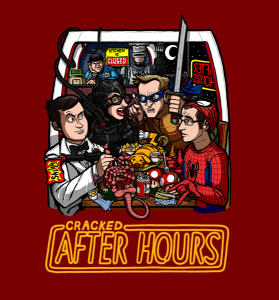
What I found to be so charming about your content was that, with the exception of very serious topics, it was clear to me that your authors put comedy first. Cracked was a place to exercise that weird, obsessive comedy muscle that nerdy communities like to flex, and it was pretty fantastic to see a group of talented writer/comedians come together in one place with that analytical humor.
With that being said, this article was likely as difficult for me to write as it is for you to read. I don’t say that because I will be greatly lampooning the caliber of your recent content, nor do I say it because this lampooning comes from someone who’s been a fan of your articles, videos, and podcasts for six years. Rather, I say it because most of the content you have pushed out since the departure of former editor-in-chief and quality-linchpin Jack O’Brien has led me to the conclusion that none of you is willing to read anymore.
Notice, writers of Cracked, that I did not say that you can’t read. I only point this out because I don’t want to give you the straw with which to build an unfair scarecrow of me—one that you can later burn down using half-thought-out insults based on, oh, I don’t know, let’s say a Gremlins 2 reference. No, it’s quite evident from this recent slew of two-minute videos you’ve been releasing daily that you are all still very much able to read—you just tend to stop reading after you get the gist of the reddit title, theory synopsis, or tweet on which you’re basing your latest work. So I applaud you for not having lost your ability to read, but I am deeply saddened by the fact that you all just don’t seem to care anymore: you don’t press on with your “research,” it seems, because you fear finding a story that discredits or disproves the central thesis of your argument. This first became apparent when you released a video as part of your video-game-centric Escort Mission series entitled “How Whitewashing in Video Games is Worse Than in Movies—Escort Mission: Nioh.”
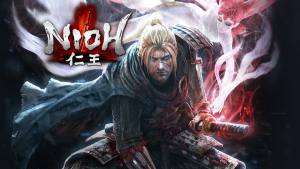
Escort Mission rapidly became one of my favorite of your series, largely because it starred Michael Swaim, whom I believe to be the funniest, smartest writer and actor whom you have on staff. However, I was also drawn to the series because it was meant to apply that analytic Cracked logic to the interactive visual medium video games, which is a topic that is very clearly quite close to my heart. Swaim, I thought, was the perfect person from your website to do a series on video games—not only because of his quick wit and knowledge of video games, but also because of his passion for games as a storytelling medium, which he has expressed countless times on the Cracked Podcast.
Up until mid-August of this year, I was pleased to see that Escort Mission was exactly what I hoped it would be: a comical analysis of weird quirks in video-game storytelling that we all experience but never quite think about. And while there are certainly a number of episodes that raise points with which I personally do not agree (“How Fallout Proves Morality is Arbitrary” being one of the strongest examples of this—seriously?), there are just as many that offer a sardonic-yet-cogent look at aspects of video games that hugely impact how we play them. The episode discussing how Skyrim and other video games creating a sense of realism by absolutely boring you with its minutiae is one that I think has incredible potential; I would actually consider writing an in-depth analysis based on the points raised in that video.
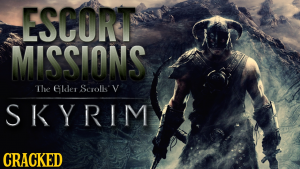
Regardless of whether or not I personally agreed with the topics portrayed in Escort Mission, I could always rely on two things from the series:
- The episodes would be well-written and funny, with excellent banter between the two characters that give both sides of an argument equal credence.
- Whoever wrote the script—whether it was Michael Swaim or someone else—had clearly played the video game in question, and basically understood what it was trying to accomplish.
These two things, in my mind, showcased a trait that is sorely lacking all over Cracked, but particularly in the embarrassing, poorly-written, barely-researched video on the game Nioh: integrity.
This video upset and angered me not only because I am a huge fan of Nioh, not just because I’ve dedicated a decade of my academic life to studying Japanese language, history, and religion, and not solely because the video has a clearly clickbaiting title trying to capitalize on the recent Hollywood whitewashing debacles of The Great Wall and Ghost in the Shell. Most of all, the video upset me because it showed a clear lack of research, a barebones knowledge of the game you were lambasting, and that loss of integrity that is becoming more and more evident with each two-minute video that could have easily been a bullet in one of your Photoplasty contests.

But I won’t just make those claims and shame you for them, Cracked. I’m going to make them, back them up by skewering your insipid video, and then shame you for it.
Let’s get going, then.
TWO REASONS WHY MENTIONING WHO MADE THE GAME MATTERS
Even though brevity don’t get them clicks, bruv.
- THE MAIN CHARACTER IS AN ACTUAL HISTORICAL FIGURE CENTRAL TO MODERN JAPANESE HISTORY
Hopefully you don’t fall victim to your own tactic and skip the meat of the paragraph after reading the title, because I make a few points here that are fairly useful when critically discussing a video game.
As the title of your video implies, this episode on Nioh delves into the problem of whitewashing in video games, and how shameful it is to make a game steeped in Japanese history and lore, with a story that revolves around “William Adams,” a blonde, white man from Ireland.
And that makes sense, right? I mean, if it’s a game about Japan, why not make the avatar Japanese? Why must it be a made-up white dude on an arbitrary mission to Japan from England? If the point of Nioh is to tell the story of the end of the Warring States period of Japan, why not take a real historical figure and make him the protagonist?
I mean, it’s not like William Adams is a real person, let alone a key figure in Pre-Tokugawa era Japanese history who travelled to the country during a time of intense political upheaval, sided with the man for whom the following era would be named, and was one of few non-Japanese people to be awarded the title “samurai” by the person who would become Shogun preside over the most notorious period of Japanese history.
Oh wait.

Oh wait, that all did happen, though.
Oops.
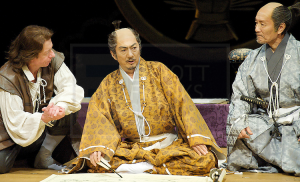
A play that preceded Nioh. There’s William, on the left.
You open your video with the “N00b” character saying, and I quote; “What’s this, uh, The Great Wall game? What are you, Matt Damon, huh?” To which the “L33t” character, played by Swaim, responds by saying “no,” but adding that N00b’s “point about whitewashing in Hollywood is well taken”: the fact that N00b conflates a movie about China and a game about Japan makes his snarky opening gambit problematic and reductive.
That’s a good opening to the video, because it sets up the uninitiated, non-gamer “N00b” as having a simplistic view on the game upon first seeing it, and then having the more knowledgeable “L33t” character cut him down by saying he’s just as reductionist as he thinks the game is: N00b sees a Japanese setting and makes a joke about a notorious, whitewashed movie about Chinese history. If I were to only see the first thirty seconds of this video and ignore the remaining four and a half minutes, I’d think that this video may be about people making assumptions and jumping on the “oh my, how offensive and culturally appropriative this game is” bandwagon.
But oh, how wrong I would be.
L33t proceeds to explain that the game follows William Adams, a blonde, Irish sailor who travels to Japan during the Warring States period so that he can track down Edward Kelley, another Englishman, who stole his guardian spirit. Jokes then abound from both parties about how silly it is to have this random white guy as the protagonist of a Japanese story, and we all have a good laugh about how annoying it is that even video games can’t escape the whitewashing problem that movies have.
Now, listen, I do have a modicum of self-awareness here. I realize that not everyone who plays Nioh is going to have the same knowledge of Japanese history that I, someone who has a degree in it, do. I understand that it is strange that a game that bills itself as a magical realist romp through Japan begins in England and stars a blonde, Irish guy named William. But you know who should do a bit of research on something before making a video about a game? A website that espouses the ideals of journalistic integrity, whose former editor-in-chief admitted to rejecting certain articles if they put jokes before the truth.
Maybe a series discussing quirks and oddities about video games that the hosts are literally shown playing on-screen should be written by someone who has actually played the game. Maybe then, the writer would have realized that there is an overwhelming theme of distrust towards outsiders inherent to Nioh, and that maybe the reason the developers chose to have a white man as the protagonist was because the larger story they were telling was one about the inherent difficulty of multiple groups coming together to form an all-inclusive nation. Maybe the choice to have William as the game’s avatar was deliberate: he, after all, is an outside force, affecting the outcome of the insurmountable internal problem that was bringing all the different Japanese states under one government—kind of thematically pertinent to the challenge that a gamer has as an outsider engaging with a game’s rules to achieve an outcome the game has preordained for them.
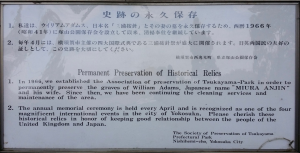
Weird that this guy is literally buried in Tsukayama.
And maybe it’s cool since William Adams was an actual person whose efforts to turn the tide in favor of Tokugawa Ieyasu irrevocably changed Japanese history to the point where he has statues erected of him in Japan.
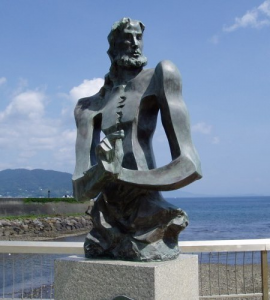
But what the hell do I know.
- HOLLYWOOD FILM PRODUCERS AND JAPANESE VIDEO-GAME DEVELOPERS ARE ACTUALLY TWO SEPARATE GROUPS OF PEOPLE
I mentioned in the last section how hung up on whitewashing in Hollywood films both N00b and L33t are in this video. That would be absolutely fine, were it not for the many points I enumerated against them in that section, as well as the fact that this game was developed by two—count ‘em, TWO—Japanese video-game developers.
Originally, Nioh was intended to be a multimedia reimagining of an unfinished Akira Kurosawa script about the life of “Western Samurai” William Adams. It was meant to be a kind of artistic love letter to Kurosawa, whose work continues to be a pillar of Japanese art to this day. The video-game portion of this multimedia endeavor was handed off to a developer named Kou Shibusawa in 2004.
Let it sink in, for a moment, that this game not only began as a Kurosawa tribute, but that it had also been kicking around Japanese development tables for the better part of thirteen years before its release. Kou Shibusawa spent eight years working and reworking the game, but was never quite satisfied with the end product; so, he ended up passing it onto another Japanese developer, Team Ninja. Team Ninja had the project for another four years, and, in April of 2017, Nioh was released by Koei Tecmo in Japan, and by Sony Interactive in North America.
So not only was this intended to be the story of William Adams from the project’s inception in 2004, but this was such an important project to those involved that it literally took the first developer eight years to realize he could not do this project justice, which prompted him to hand it off to a team that could. Nioh is unlike The Great Wall and Ghost in the Shell for so many reasons, the most important one being that this was an inherently Japanese story, created by Japanese developers, with a vision so specific that they spent thirteen years and two teams to get it right.
William Adams wasn’t just thrown into the game to appeal to a Western audience: he was the whole crux of the story they wanted to tell.
And listen, the last thing I want is to come off as some sort of whitewashing apologist here, but I truly don’t think that argument could be made against me in this situation—largely because I put the time and effort into figuring out whether or not I’d be justified in making these points. So all I’m saying, Cracked, is this: if Adams weren’t a seminal figure in Japanese history, and if the game weren’t based on a Kurosawa script, and if it weren’t developed by two Japanese developers and published by two Japanese publishers, then I might get behind you on the whole whitewashing-in video-games-thing.
But I can’t get behind you. I can’t because your analysis of the game is simply not true, and I’m disappointed in whoever at Cracked wrote this script for not taking the two minutes of Wikipedia research I just used to write this section of the article.
But no, Cracked, you had a point to make, didn’t you? You had a point about whitewashing in media that you so desperately wanted to make. The problem was, you kind of missed the window where The Great Wall and Ghost in the Shell were relevant talking points; so, you waited for a new chapter of DLC to be released so that Nioh might pop up on Google a bit more frequently.
You had a point to make that was immediately discredited by the half of your comment section who actually bothered to put more than a moment’s thought into the script you had written and the video you had made.
You had a point to make—which, to you, precluded actually playing the game! “There’s a white guy on the cover of this game with Asian writing on it; never mind that the history of William Adams is actually documented in the text of the game!”
You had a point to make, and you made it at the cost of your integrity.
Funny vid though, guys.
CRACKED IS BAD NOW AND IT BUMS ME OUT
I don’t really need this here, but you don’t need half your intertitles, either.
So, Cracked, listen: you may be wondering why this nobody decided to spend nearly a month writing and rewriting this response to a video that you put out over two months ago. You know what? That’s fair. I’m wondering that, too.
I suppose it’s because I feel as if I owe a lot of my writing style and comedic sensibility to the excellent content you have produced over the years, and so, to see the guy whom I saw at the paragon of that content release such a shameful, shoddy video, decrying a non-existent issue in a game that none of you likely played, much less spent time to put effort into analyzing, is just… disappointing to me.
As I see it, two huge things happened in the past year or so that has set your course in a strange—and, frankly, disconcerting—direction.
- Trump inexplicably became President of the United States.
- Editor-in-chief Jack O’Brien parted ways from the site he helped build.
I’ll get to the former in just a minute, but the latter is something I see as sadly evident from all the recent content you have been peddling.
I remember when Jack announced his departure from Cracked in an episode of the Cracked Podcast. I was initially saddened to see him go, but I remember being very optimistic about the work the site would produce in his absence. As I understood it at the time, his long-term business partner would be taking his place, and long-term contributors like Daniel O’Brien, Alex Schmidt, Michael Swaim, Katie Willert, Katie Stoll, Soren Bowie, John Cheese, David Wong, Adam Ganzer, and countless others would all pick up the mantle and ensure that the website was putting out the same quality content that people had come to expect.
While all those people are still working for Cracked, there was an obvious change in tone that happened quite literally the day after it was announced that Jack O’Brien had had his last day as editor-in-chief.
A ton of new series were shoved out that day, and there was a noticeable change in demeanor, with responses becoming far more politicized, and scripts and articles being written with as much vitriol towards the political landscape as possible. And please, don’t misunderstand me: I think that, now more than ever, it is important to be biting and sardonic towards the political system. Cody Johnston’s show, “Some News,” for example, is doing the kind of satirical and informative work regarding politics that no other show is doing.
The problem, though, is that Cody seems to be the only one doing the research to ground the sardonic vitriol he uses in his show. “Some News” is funny to me because I trust Cody is actually putting in the work. That Nioh video, though? And all these piddly little two-minute videos you keep plastering on my subscription feed everyday? They scream of pushing “insights” that are neither earned nor defensible, and it’s genuinely upsetting to see you move in that direction as a publication. I can’t say for sure whether Jack’s editing truly lent more integrity to your articles, but I’m inclined to believe that his leaving the website and the corresponding increase in poorly thought out, ill-researched articles and videos can’t be coincidental.
What I’m getting at is this: you could very easily read my problems with that stupid Escort Mission video and say to me, “Relax, it was a joke and all in good fun”; however, when I have that video in my head when I see your political articles, or your interview series, what reason do I have not to assume all those videos are “jokes,” too?
When something as simple as opening up the Nioh Wikipedia article completely tears down your video, why should I believe you research anything?
So, in closing, I’m sorry that you’ve lost the integrity I assumed that you had. If I had any positive notes, I’d say that Cody is doing a bang-up job with “Some News,” Alex Schmidt is a charming and affable Podcast host, both on Cracked and with Kurt Vonneguys, and I wish Swaim were more visible on the site.
I’d say to keep up the good work, but we both know where that well-wish would be crammed.
Cheers, Cracked,
Dan W. Hughes.

